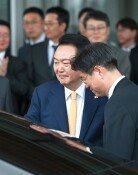No need for 300 lawmakers
No need for 300 lawmakers
Posted April. 06, 2018 09:12,
Updated April. 06, 2018 09:12
An extraordinary National Assembly session of April was initiated for one month on Monday but criticisms are growing that it is even not worth applying the minimum wage to the National Assembly, which is rather a nuisance to the society as no business is being carried out. Despite the fact that the ruling and opposition parties opened the extraordinary session with an intention to settle urgent agendas including various public welfare bills, constitutional amendments, revised supplementary budget bill and National Referendum Act, they have not been even able to agree upon setting agendas and only seem to continue a power struggle.
The floor leaders of the four negotiation bodies of from the ruling and oppositions have maintained official and unofficial contacts to discuss constitutional amendments for the past five days until Thursday but failed to reach an agreement. The situation is as serious as to have Roh Hoe-chan, floor leader of the Group of Lawmakers for Peace and Justice, says, “The positions from each party are so different that discussions are more parallel than inter-Korean talks.” Discussions on revising the scope of applying the minimum wage, which is directly related to the public welfare, was also at a standstill. The opposition parties request to handle amending the broadcasting act and the ruling party’s request to pass the bill to establish an independent agency for investigating corruption among senior government officials and their families clashed, which canceled the entire schedule of the Standing Committee.
With the regional election coming up on June 13, it is unclear whether the extraordinary National Assembly session will be initiated in May, which makes the April National Assembly session the last one of its kind in the first half of this year. A failure to narrow differences in dealing with various bills for the public welfare including minimum wage will aggravate the pain of small-scale businessmen and ordinary citizens working at small and mid-sized companies. The stakeholders and citizens are torn by anxiety but the ruling and opposing parties are absorbed in political calculation, laying the livelihoods of the public aside. No wonder why the citizens agree on amending the constitution to disperses the power of an imperial-like presidency but feel uncomfortable to grant more power to the National Assembly, which seems to exercise no productivity whatsoever, giving it the name “vegetative National Assembly” and “fossil National Assembly.”
The French government announced on Wednesday (local time), a political reform bill that decreases the size of the senate and the house of commons by 30 percent and prohibits three consecutive appointments of elected officials. The French parliament is resisting but the citizens are giving a round of applause to President Emmanuel Macron, who directly started operating the “French disease,” a symbol of inefficiency. The political reform underway in France allows us to look back on our reality. It has been long since the South Korean National Assembly degenerated into a “sterile National Assembly,” taking special privileges and unable to reap timely results blinded by the success and interests of political parties. Why would we need 300 lawmakers who only play the role of a “yes-man” in their respective party?







